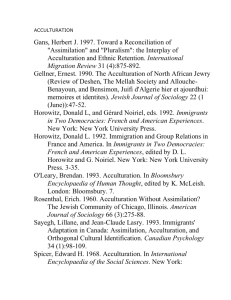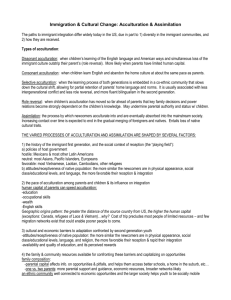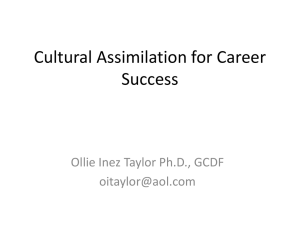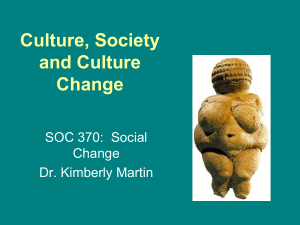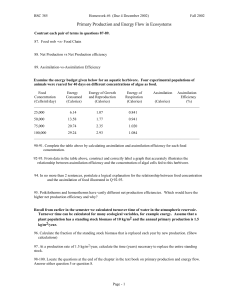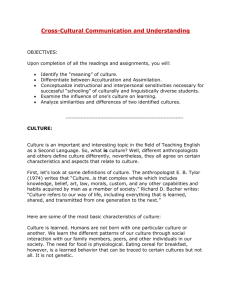Honors American History
advertisement
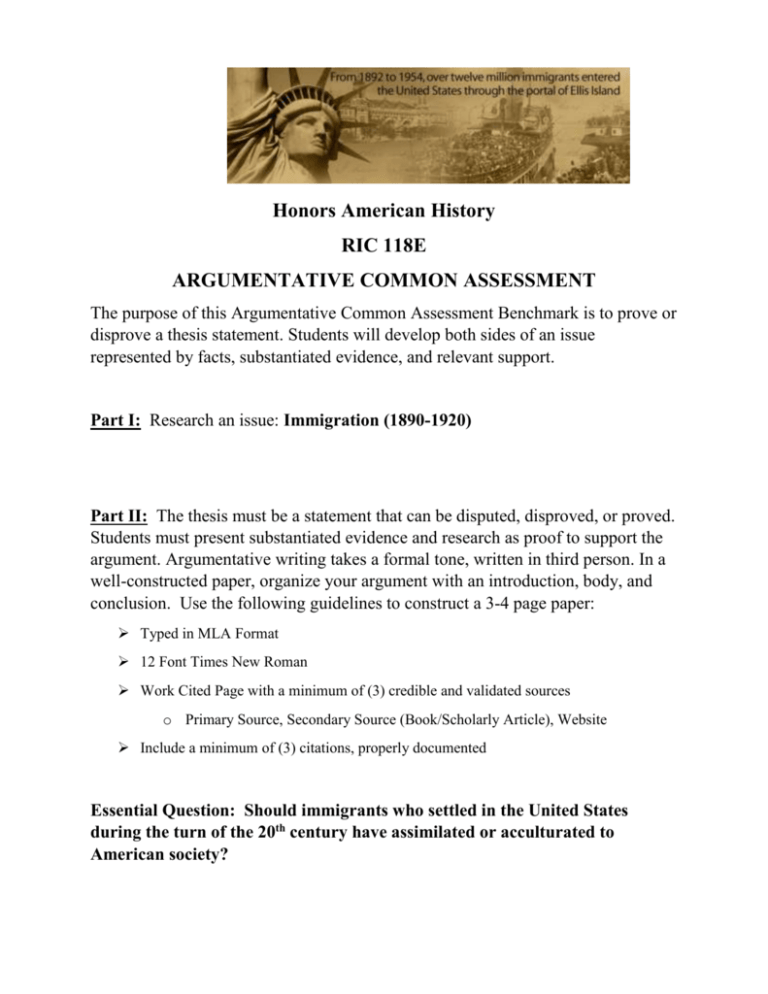
Honors American History RIC 118E ARGUMENTATIVE COMMON ASSESSMENT The purpose of this Argumentative Common Assessment Benchmark is to prove or disprove a thesis statement. Students will develop both sides of an issue represented by facts, substantiated evidence, and relevant support. Part I: Research an issue: Immigration (1890-1920) Part II: The thesis must be a statement that can be disputed, disproved, or proved. Students must present substantiated evidence and research as proof to support the argument. Argumentative writing takes a formal tone, written in third person. In a well-constructed paper, organize your argument with an introduction, body, and conclusion. Use the following guidelines to construct a 3-4 page paper: Typed in MLA Format 12 Font Times New Roman Work Cited Page with a minimum of (3) credible and validated sources o Primary Source, Secondary Source (Book/Scholarly Article), Website Include a minimum of (3) citations, properly documented Essential Question: Should immigrants who settled in the United States during the turn of the 20th century have assimilated or acculturated to American society? Structure of Response: Introduction: (1) Paragraph Begin with a strong hook appropriate to the audience and consider including the following: A strong statement establishing the historical context (set the scene and tone). A relevant quotation. (Must not be evidence but rather a song lyric, newspaper headline, statistic, etc.). A rhetorical question that appeals to credibility/trust, logic, and/or emotions. Connect hook to historical context elaborating on the significance of the historical climate of the topic. Construct a thesis that provides a clear, strong statement that disputes, disproves or proves a point to be discussed supported by facts and substantiated evidence. Last sentence of introduction italicized. Body: Develops both sides of an issue represented by facts, substantiated evidence, and relevant support. Claim: (2) Paragraphs The argument proven by facts, substantiated evidence, and relevant support. At least two claims should be presented with connecting substantiated evidence for each claim. Explanations are to be given that show how each piece of evidence is supportive. Be sure to separate claims into (2) distinct paragraphs. Counterclaim: (1) Paragraph The opposing argument is represented by facts, substantiated evidence, and relevant support. Respond/refute with at least one counterclaim and connect the substantiated evidence. Explanations are to be given that show how this piece of evidence is supportive. Conclusion: (1) Paragraph Students will summarize the main ideas with an effective restatement of their thesis and restate supporting points. Argumentative writing must confirm the evidence that proves the thesis statement. Last sentence of conclusion italicized. Name_______________________ Date________________________________ Directions: Use this graphic organizer to help organize or outline your ideas for your essay. Outlining ideas is a critical component to the writing process. Introductory Paragraph Hook the audience: Give a little background on the issue: Thesis: Body Paragraph #1 Claim #1 List out your Evidence of Support Body Paragraph #2 Claim #2 List out your Evidence of Support Body Paragraph #3 Counterclaim List out your Evidence of Support or refutation of the counter claim Conclusion Paragraph Restate Your Main Idea Directions: Try to incorporate these devices into your Argumentative. Place your examples in the 2nd column. Persuasive Device Rhetorical Device Logos/Logical Argument Pathos/Emotional Appeal to your Audience Ethos/ Credible Source Research Example Acculturation vs Assimilation Acculturation and assimilation are two very important concepts in sociology and anthropology that describe cross cultural effects on both minorities as well as majorities in societies that are multi ethnic and multi-cultural in nature. Assimilation is a broader concept as described by sociologist Jean Piaget and refers to the manner in which people take new information. There are many people who think of the two concepts as same and even use them interchangeably. However, this is not correct as there are subtle differences that will be pointed out in this article. Acculturation If you belong to a minority community in a country and retain your own culture but cannot remain isolated and are affected by the majority culture in such a way that you adapt to some aspects of the majority culture, the process is referred to as acculturation. It can be said that the individual, or for that matter, most of the members of this community are bicultural. It so happens that the original customs remain, and the members of the community accept customs from the majority community. In a multi ethnic society such as US, a person who is Hispanic or has Chinese roots remains attached to his own culture while adapting and accepting some of the customs of the whites. Meeting of cultures is never a one sided process as many believe and, though a person belonging to a minority culture may begin to dress and speak like those belonging to the majority culture, he still retains the beliefs and customs of his own culture thus reflecting the process of acculturation. Acculturation process has many outcomes of which important ones are assimilation, rejection, integration, and marginalization. The importance of acculturation can never be overemphasized in the study of cross cultural influences and the ways peoples of different ethnic identities learn to adapt and accept the cultural traits of a majority community in a multiethnic society. Assimilation Assimilation is a process whereby people of a culture learn to adapt to the ways of the majority culture. There is a loss of one’s own culture as a person gives more value to the cultural aspects of the majority community in the process of assimilation. This has been the case in the United States that has been the centre of attraction of immigrants from many different countries. When the original customs and traditions of a culture get lost when it is influenced by the majority culture of a country, the process is referred to as assimilation. Assimilation is the process that inevitably takes place whenever there are immigrants arriving in a country from a foreign land. Assimilation is a process that can be in degrees, and full assimilation is said to have taken place when it becomes hard to tell that the person belongs to a minority culture or is from the majority culture. What is the difference between Acculturation and Assimilation? • Meeting of cultures always produces results in terms of changes in both the cultures, and acculturation and assimilation refer to two important and different changes in these cultures. • Assimilation refers to the process where some of the majority community’s cultural aspects are absorbed in such a manner that the home cultural aspects get mitigated or lost. • Acculturation is a process where the cultural aspects of the majority community are adapted without losing the traditions and customs of the minority community. • Minority culture changes in the case of assimilation whereas it remains intact in the case of acculturation.

